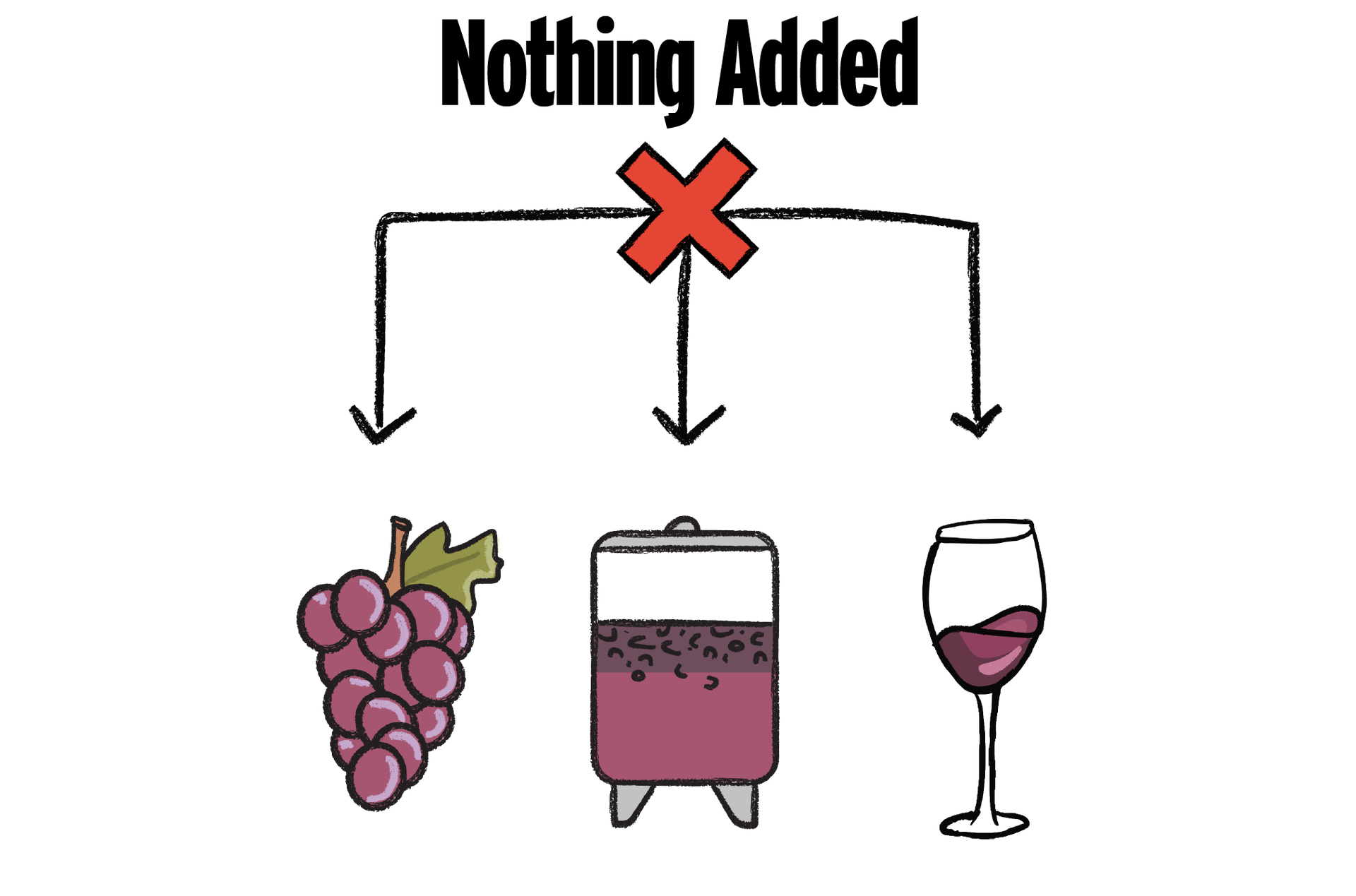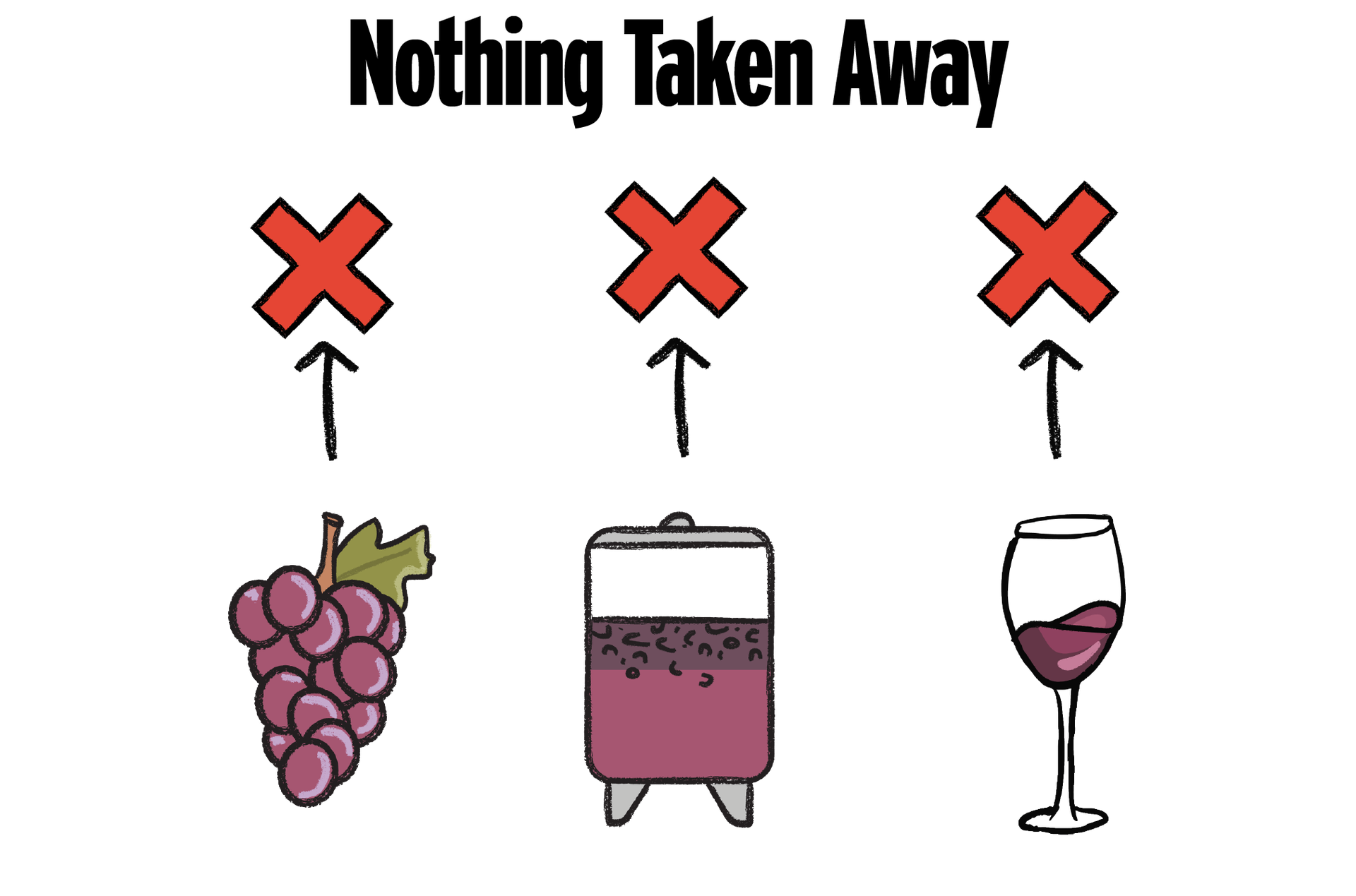

Natural wine, vegan wine, biodynamic wine, organic wine — what's the difference? Learn the basics here!


Natural wine, vegan wine, biodynamic wine, organic wine — what's the difference? Is one better than another? Can a wine be all of them or only one of them? And do they taste different to "regular" wine?
There are a lot of clean and green terms out there in the wine world these days. And one thing's for sure, these "clean" terms can sure get messy when it comes to how they are understood and defined. Some of these terms are regulated by certifications bodies, some are more loosely defined.
Today we are going to run through them all, so you know the truth behind what each of these terms implies about the grape growing methods, winemaking decisions, and how each affects the style you experience finished bottle!
Your wine coaches,
Banjo & Alex

Each of these wine terms can be defined either by specific decisions in the grape growing process (synthetic fertiliser vs organic), in the winery (added yeast strains vs native yeasts) and even when it comes to bottling the wine (addition of preservatives or not)! Different growing environments, grape types, and, of course, the winemaker's personal philosophy all play an integral part in which methods will be used. For example, some grapes are naturally more disease and pest resistant and therefore can more easily be grown organically. Likewise, some flavour profiles can be achieved more reliably with the use of commercial yeasts vs native yeasts (aka wild yeast or natural fermentation). It all depends on what the winemaker wants to express, the price they want to be able to sell their wine for, and how they think that expression can best be created!

Nothing added, nothing taken away.
Ahh, natural wine. Probably the greatest debate in the wine world of the past decade. But what is it? It's hard to give a clear answer, partly because there is NO real globally agreed-upon definition for natural wine. It's not regulated, it's not defined; in fact some of the winemakers who make natural wines love it this way! So how do you get a clear picture of what (and what doesn't) make a natural wine? For us here at GPD, and most of the world of wine professionals, natural wine is made with nothing added and nothing is taken away.
Let's break that down. There are many factors that come into play.
Nothing added
Nothing is being added to the wine. So it is simply grapes. What are the things that other winemakers add that natural winemakers don't? On the vineyard - copper and sulphur and other preventative chemicals like weedkillers. In the winery - yeast, acid, tannin, sulphur.

Nothing taken away
Nothing is being taken away. It is the fermented grape juice in its natural form. What are the things that other winemakers take away that natural winemakers don't? No filtering, no fining, no reverse osmosis.

How the Wine Tastes
Often cloudy in appearance (due to no filtering or fining) and show a more wild and raw expression. Sometimes even kombucha-like! Due to the absence of preservatives, they can be more prone to oxidise at a faster rate and can occasionally have a slight spritz.
*Natural wines are inherently organic, but organic wines are not necessarily natural.

No animal by-products are used in the filtering process.
No there isn’t meat in your wine. But the use of some animal byproducts like egg white, gelatin and isinglass (collagen from a fish bladder!) are quite common in the filtering process of wine (and beer!). These byproducts are not in the final bottle, but are merely used to give the wine its pretty, bright clear colour. Vegan wine instead uses a substitute like bentonite (clay) or are simply unfiltered.

How the wine Tastes
There's no obvious flavour difference to conventional wines. But sometimes they can be less clear, or more cloudy, with sediment or tartrate crystals if they are unfiltered.

No chemicals in the vineyard and/or the winery
Organic wines are those which have been produced with no chemical or unnatural intervention. This means no chemical fungicides or pesticides (natural alternatives are used, with great success), and non-natural preservatives will not be found within the bottle itself. Some wine growing regions are more suitable for organic viticulture than others. For example, areas with lots of wind and dry weather, like in Argentina and Spain, mean the grapes have natural protection from fungal diseases and pests. However, in rainy or wetter regions with more moisture in the air, such as in the Bordeaux region of France, grape growers need to be extra careful and may be more likely to use and require the use of fungicides to protect their grapes from mildew and fungal diseases.

Organic wines have a certification body that is globally recognised, however many organic producers still find themselves having to answer the million-dollar question: To be certified, or not to be?
Some wineries practice organic farming but aren’t certified. This can often be because they want the flexibility to intervene with their vines if a difficult vintage occurs that puts their crop in danger, or due to the cost of certification. It is also rare to see large-scale operations work completely organically, as they rely on highly consistent crops to keep up with their production volume and provide a more stable house style.
How the wine tastes
There's no obvious difference in flavour or structure to conventional wines.

A holistic approach to that follows the lunar cycle.
Biodynamic farming was the brainchild of Rudolph Steiner, an educational and agricultural reformer, and took off as a movement in the 1920s. It’s
a holistic approach based on the natural rhythms of nature - especially the phases of the moon, which contends that farmers can produce healthier fruit enriched by natural forces.

The idea is to create a self-sustaining system. Natural materials, soils, and composts are used to sustain the vineyard. Chemical fertiliser and pesticides are forbidden for the sake of soil fertility. A range of animals from ducks to horses to sheep, live on the soil and fertilise it, creating a rich, fertile environment for the vines to grow in. Biodynamic farming seeks sustainability, leaving the land in as good (or better!) shape for future generations.
How the wine tastes
Some great tasters believe biodynamic wines are more expressive of their terroir or origin than conventional wines. They also claim the wines feel and taste more “alive” and richer in character.
*Biodynamic wines are inherently organic, but not necessarily vegan or natural.

Key Reading
1. Natural wine: A general overview.
2. Organic & Biodynamic wine: A general overview
3. Vegan wine: A general overview
Bonus Reading
4. Learn more about low preservative wines
5. Learn more about how the wine industry works to understand why smaller and larger producers may choose to certify or not based on their size and production volume.
Quiz
Ready to prove your new wine knowledge? Take the Chapter 7 Natural, Vegan, Organic & Biodynamic Wine Quiz! You'll earn your Chapter 7 Badge as well as 50 points by scoring 7/9 correct!
Homework
The best kind of assignment... tasting!
For today's assignment, you will be tasting a natural white wine! Hopefully, there will be plenty of sediment here, since nothing has been taken away from the wine (and is therefore unfiltered).
Did you know that by shaking the bottle, the sediment can move around more and change the tasting experience? You're going to try it first hand!
First, pour a regular glass of the natural white wine and set it aside. Then take the opened bottle, put a closure on it and shake or swirl the bottle to evenly disperse the sediment throughout the wine (instead of it being settled and clumped in one area). It should look well mixed and cloudy. Pour another glass with this new cloudy shaken wine, and taste it side by side with the unshaken glass!
Ask yourself questions like how the flavours and texture are expressed differently. And as usual, which do you like better?

Wow, look at you go. We've sure covered a lot of new material over the past few weeks. And only one more class and you're finished the whole course! Well done keeping up and expanding your wine knowledge. We hope you've got some bubbly ready to celebrate when you finish the next and final chapter!
Happy Wine Learning!
Alex & Banjo
Do you know your wine personality? If your answer is no, take our quiz to find out which wines to pick up next and build your box!
Build my box





